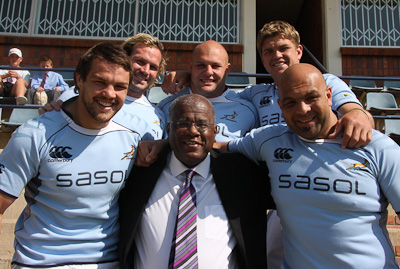Latest News Archive
Please select Category, Year, and then Month to display items
04 April 2024
|
Story Lunga Luthuli
|
Photo SUPPLIED
 Dr Juliet Kamwendo champions gender-inclusive climate action in Africa. Her expertise at the recently held AFR100 workshop highlighted vital steps towards sustainable and equitable development.
Dr Juliet Kamwendo champions gender-inclusive climate action in Africa. Her expertise at the recently held AFR100 workshop highlighted vital steps towards sustainable and equitable development.
Dr Juliet Kamwendo, Lecturer and Programme Director for Gender Studies in the Centre for Gender and Africa Studies at the University of the Free State, is spearheading efforts to integrate gender considerations into Africa's climate restoration agenda. Reflecting on her involvement, Dr Kamwendo stated, "This is particularly crucial, as women make up almost 50% of the population in Africa, and the depletion and degradation of land affect them disproportionately."
She recently served as a gender expert at the AUDA-NEPAD AFR100 workshop in Ouagadougou, Burkina Faso, from 25 to 29 March 2024. This initiative aims to restore forests and degraded land across Africa by 2030, with a focus on gender equality.
The workshop emphasised the integration of gender perspectives into the AFR100 project, acknowledging the disproportionate impact of land degradation on women. Dr Kamwendo's expertise highlighted the need to empower women in climate change interventions, addressing existing gender inequalities exacerbated by environmental degradation.
“Women – who are primarily responsible for household food security and water provision – bear the brunt of environmental degradation, leading to increased workloads, reduced income opportunities, and heightened vulnerability to climate-related disasters. Furthermore, the loss of forest cover and biodiversity further exacerbates the challenges faced by women, particularly in rural areas where they depend heavily on natural resources for their livelihoods,” added Dr Kamwendo.
Her participation highlights academia's crucial role in fostering inclusive and sustainable development, emphasising interdisciplinary collaboration to tackle complex environmental challenges. Through initiatives such as AFR100, stakeholders are working towards a more resilient and gender-responsive future for Africa.
Springboks choose Kovsies' sports facilities
2010-09-02
 |
|
The Springbok team boasts five former Kovsies. From the left, front, are: Flip van der Merwe, Prof. Jonathan Jansen, Rector and Vice-Chancellor of the UFS, and Gurthro Steenkamp. At the back, from the left, are: Jannie du Plessis, C.J. van der Linde and Juan Smith.
Photo: Gerhard Louw
|
Over the years the University of the Free State (UFS) has already produced 67 Springbok and 22 Springbok Sevens players. Therefore it comes as no surprise that the Springboks have chosen the UFS’s sports facilities in preparation for their match against Australia this coming Saturday. They will tackle Australia at the Free State Vodacom Park at 17:00. Five former Kovsies are included in this team. They are Flip van der Merwe, Gurthro Steenkamp, Jannie du Plessis, C.J. van der Linde and Juan Smith.
Kovsies have been providing quality rugby for many decades already. During the 2009 rugby season the UFS rugby club produced 12 players for national teams and 73 players for provincial teams (all age groups). This does not include all the former Kovsies. According to Mr Rockey le Roux from KovsieSport at the UFS, there is currently not one South African Super 14 team that does not include a Kovsie or former Kovsie.
The UFS is also equipped to produce top rugby players. Shimla Park is the main field of Shimla rugby, where all the Shimla games are played. Some of the Varsity Cup games are also played on this field. Boom Prinsloo, the Shimla player named as the 2010 player of the Varsity Cup tournament, is included in the current Springbok Sevens practice team. Shimla Park boasts 1 000-lux lights, which let this field comply with international standards.
There are four more rugby fields that are used for residence rugby. Currently 26 rugby teams of the university's residences and three provincial teams practise on the fields.